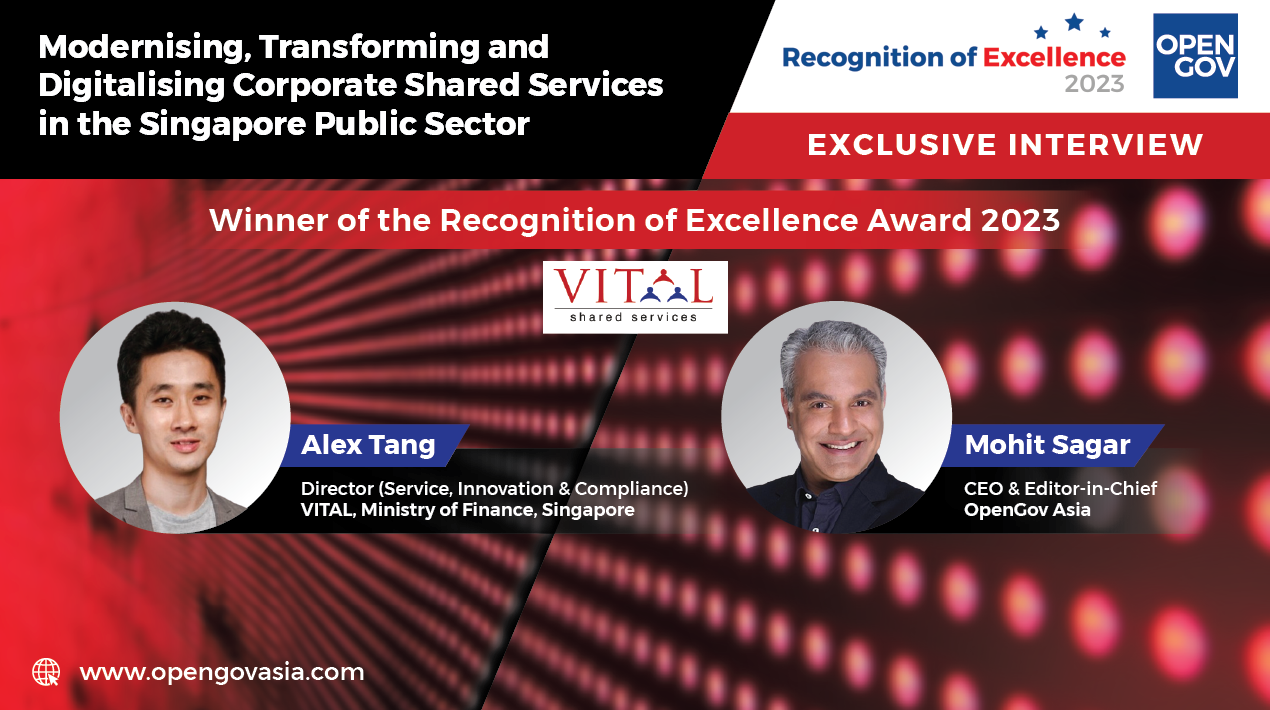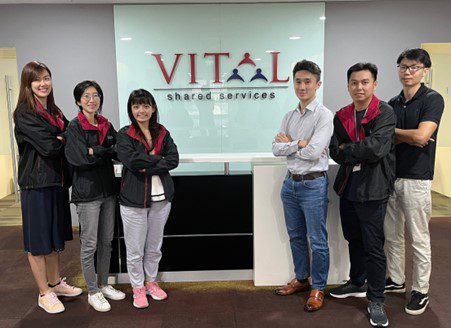
To increase efficiency and productivity, leverage better insights for decision-making and provide seamless digital services for citizens, Singapore’s government is investing in digital technologies such as robotic process automation, artificial intelligence (AI), and data analytics.
The government is prioritising modernisation, transformation and digitalisation of its corporate shared services to improve service quality and efficiency and the overall customer experience. By reducing manual workloads and eliminating errors, these technologies will enable the development of new skills in its employees and create capacity for new priorities.
OpenGov Asia is pleased to recognise VITAL for its innovative and disruptive use of technology in the public sector through the optimisation of government processes and the pushing of new limits.
Providing common services in human resource, payroll, finance and procurement to over 100 public service agencies, VITAL, a department under the Ministry of Finance and the central agency for corporate shared services, has earned a stellar reputation over the years as an organisation that actively leverages digitalisation and automation at the enterprise level. Through the use of digital technology and robotic automation, the agency has successfully managed and transformed corporate service delivery for the Whole-of-Government (WoG).
VITAL has worked to expand and propagate its digital and automation capabilities internally and among Whole-of-Government (WoG) agencies. This is aimed at achieving economies of scale, enhancing efficiency, strengthening governance, and improving the quality of service.
All these endeavours have led VITAL to being awarded the prestigious OpenGov Asia’s Recognition of Excellence Award which will be conferred during the 8th Annual Singapore OpenGov Leadership Forum 2023.
VITAL’s Digitalisation Strategy for Enhanced Service Delivery
 Alex Tang, Director (Service, Innovation, and Compliance), VITAL, Ministry of Finance in Singapore, said that VITAL’s Digitalisation Strategy led to the transition from manual, paper-based processes to digital services and operations. These services are provided to their service partners and public agencies that they have collaborated with over the years.
Alex Tang, Director (Service, Innovation, and Compliance), VITAL, Ministry of Finance in Singapore, said that VITAL’s Digitalisation Strategy led to the transition from manual, paper-based processes to digital services and operations. These services are provided to their service partners and public agencies that they have collaborated with over the years.
“To encourage greater adoption of these tools, we developed an in-house ‘Digital First’ microsite to share use cases, tips, and resources with VITAL officers and conducted frequent brown-bag sessions to generate greater awareness of digital tools,” Alex explains.
VITAL has dedicated significant efforts to upskilling its officers in automation. In addition to training 28 officers in Robotics Process Automation (RPA) developer software to automate complex tasks, they have trained and provided low-code RPA developer software training to over 140 officers. This approach enables a broader group of individuals to use automation to improve processes effectively.
As the Robotics and Automation lead in Whole-of-Government (WoG) for corporate services, VITAL has also developed a service-wide microsite called “Robotics and Automation Hub (R&A Hub)”. This platform provides WoG Agencies with access to RPA resources, common automation scripts and other offerings to promote the use of RPA.
As of February 2023, more than 2,300 different people had visited the hub’s site since it opened. As part of its citizen development initiatives, VITAL has taken the lead in WoG efforts in trialling low-code RPA tools.
Their automation journey included tabletop research, learning journeys, consultations, solution identification, proof of concept followed by a pilot, and gradual scaling up of implementation across multiple processes over the initial 2 to 3 years.
“In the early phase of our automation journey, we visited organisations to learn from them, consulted our advisory panel and industry experts and performed extensive research. Throughout our journey, we continually learned and adapted as we implemented RPA,” Alex recalls.
To reap the most benefits and ensure the long-term viability of the automation initiative, it was critical for process owners and developers to align their understanding to ensure robust process selection – focusing on those that were manual, tedious, repetitive and rule-driven to reduce abortive work and building scripts that do not meet business needs.
 VITAL’s digitalisation is the result of an ecosystem that includes a central innovation team that is supported by Ops-Tech specialists and process experts in the Operations functions.
VITAL’s digitalisation is the result of an ecosystem that includes a central innovation team that is supported by Ops-Tech specialists and process experts in the Operations functions.
The VITAL Innovation Hub is made up of a group of specialists who conduct technology exploration and agile experimentation to source, test and scale up innovative solutions that improve VITAL’s efficiency and effectiveness. This team drives the digitalisation and automation agenda, collaborating with operations functions to identify appropriate processes for testing, scaling up and spreading automation adoption throughout the organisation.
Initially, the Innovation Hub led by Jessica Ong, Deputy Director (Innovation Hub) has played a critical role in the early stages of the project as the developer, working closely with process experts in operations to collect business requirements, develop scripts, and deploy them. However, as the RPA developer capability within Operations grew, the Ops-Tech specialists in the line functions took over this role.
At the same time, the Innovation Hub shifted to a governance and advisory role, responsible for reviewing and deploying scripts, upgrading applications, troubleshooting incidents, providing guidance, and building capabilities.
Alex summarises the top five crucial points for successfully integrating and streamlining digitalisation and automation projects as follows:
- Speak with industry early adopters to determine the benefits and drawbacks of a solution, determine if it meets the organisation’s needs, start small and validate efficacy before scaling up.
- Deploy solid policy-operations-technology integration. Collaborate with central teams to review policy and system requirements to use technology tools.
- To reap greater benefits across the entire government, processes must be standardised and consolidated through the use of shared services and common central systems.
- Verify software and solution compatibility with key internal and external systems and applications, as well as the hosting environment.
- Avoid automating inefficiencies. Before developing a script, examine the selected process and streamline it by eliminating unnecessary steps.
Alex and his team discovered that RPA is extremely sensitive to changes in system or application performance – the more applications and systems a script integrates, the more complex it becomes. Deploying patches can have an impact on performance, including success rate, and may require more script changes.
“We found it useful to plan early and assess the complexity of the integration scope during script development,” Alex explains.
Although automation is often touted as a means to increase efficiency, it can also cause anxiety and uptake-hesitancy among employees. To overcome stress and resistance, effective communication is necessary.
VITAL took a different approach and presented Robotic Process Automation (RPA) as an enabler, freeing its people from manual and tedious tasks. This allowed them to focus on more valuable work, professional growth, and innovation.
 Developing the skills and capabilities to become an RPA developer can be challenging, especially when coding knowledge and experience are required. Fortunately, the shift towards democratising automation development through low-code or no-code tools has made it easier.
Developing the skills and capabilities to become an RPA developer can be challenging, especially when coding knowledge and experience are required. Fortunately, the shift towards democratising automation development through low-code or no-code tools has made it easier.
“Currently, we are upskilling more officers to be Citizen Developers who can tap on low-code RPA tools to automate simple, manual tasks,” Alex reveals.
Key Factors That Lead to Success
In addition to the innovation structure, Alex identifies two crucial factors for success: effective change management and a robust ecosystem that encourages bottom-up innovation.
“As a shared services outfit, we aggregate and process many transactions across WoG, which makes VITAL a fitting target for automation,” Alex states.
There are abundant automation opportunities in Operations functions, as these teams are often eager to ease their daily workload through tech solutions. To meet this immediate need, VITAL invites successful automation projects to apply for its annual innovation project awards, which recognise credible innovation efforts and successful use cases.
VITAL had also created a dashboard to track RPA script success rates and time savings – useful metrics that validate the efforts and serve as “fuel” for further automation adoption and growth.
The automation initiative is continuously monitoring the external environment for potential changes in the technology industry that could impact the solutions they use, the systems landscape and the corporate services space in WoG as part of future-proofing. This allows them to anticipate the impact of the automation programme and adjust their strategy accordingly.
“We are moving up the value chain in our automation journey by exploring the integration of RPA with the use of other intelligent tools,” Alex concludes.
He is confident that VITAL is vital to Whole-of-Government (WoG), as their efforts are intended to future-proof automation strategies across the public sector. Ultimately, they want to work more intelligently, smarter and safer to provide the best service experience they can.
















